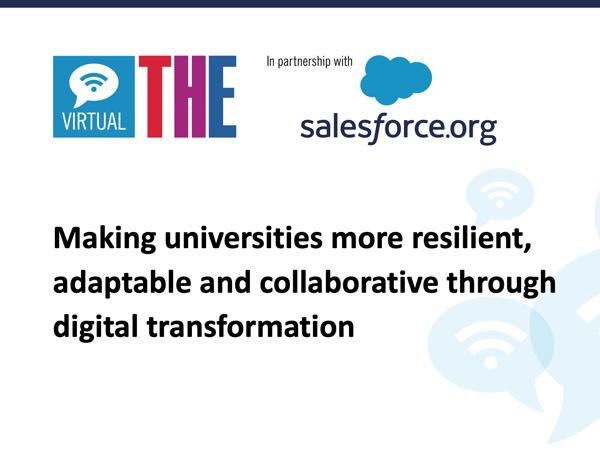
Hybrid learning improves inclusion, but social interaction remains essential to positive university experience
At a Times Higher Education webinar, held in partnership with Salesforce.org, Maëlle Lavenant, Salesforce.org’s senior product marketing manager for higher education, shared early insights from the third edition of the Connected Student Report.
The qualitative interviews that were run as part of the research found that rebuilding the student community was “the number one priority” for institutions.
Kai Peters, pro vice-chancellor of business and law at Coventry University, told the panel that during the pandemic, students complained about their fees. “But the education was the same, it was all the additional social elements that disappeared,” he said.
Coventry University has since abolished traditional lectures and has students working in small groups to provide “worthwhile, genuine engagement”, Peters explained.
Louise Naylor, director of education at the University of Kent, mentioned reports of increased loneliness among students. Her staff now embed social interaction into the curriculum, with opportunities for group work and peer interactions made a priority.
Student support has also diversified, but this has resulted in the need for more resources and training, the panel agreed. Sarah Sweeney, head of student support and well-being at Lancaster University, said offering counselling online has increased uptake.
“There's a skills challenge for some of our staff in transferring their in-person activities into the online arena,” Sweeny said. “What you don't want is for the online experience and the online support to be inferior to the in-person offer.”
The panel heard how staff training and access to technology are vital for hybrid models to work. Hybrid models must be used selectively, warned Naylor. “It can work, but no particular audience gets the best benefit out of it,” she said. “It’s hard for the teacher, the people in the room and the people online.”
Quality for all was a priority for the panel, who discussed plans to develop inclusiveness at their institutions. Rather than adjusting to accommodate individual needs, curricula should be redesigned to be innately inclusive, Sweeney suggested.
Inclusion must also consider the availability of technology and broadband access. “We had to give away or lend out laptops hand over fist during the pandemic,” Peters said. “We had over 1,000 students that were just technologically poor.”
Lower bandwidth engagement must also be prioritised, Peters added, drawing the distinction between an academic’s home office and a student with no workspace, sharing bandwidth with others at home.
The early findings from the report also highlighted employability as a major concern for students. Jacqueline McCormack, vice-president of EDI and online development at Atlantic Technological University (ATU), said her institution had been developing work-based learning courses that allow students to be embedded in the workplace and study part-time online.
Technology has allowed easier connections between employers and students, Naylor said, explaining that Kent’s business school had benefitted from short digital drop-in sessions with leaders from industry.
Peters told the panel that Coventry University has improved its employability offering by centralising its resources and using its staff to develop relevant MOOCs.
Similarly, McCormack said ATU is planning to offer “a range of microcredentials” to make acquiring the skills demanded by employers “as accessible and flexible as possible”.
The panel:
- Alistair Lawrence, special projects editor, Times Higher Education (chair)
- Maëlle Lavenant, senior product marketing manager, higher education, Salesforce.org
- Jacqueline McCormack, vice-president of EDI and online development, Atlantic Technological University
- Louise Naylor, director of education, University of Kent
- Sarah Sweeney, head of student support and well-being, Lancaster University
- Kai Peters, pro vice-chancellor of business and law, Coventry University
Watch the webinar on demand above or on the THE Connect YouTube channel.
Read the Connect Student Report here.
Find out more about Salesforce.org.

